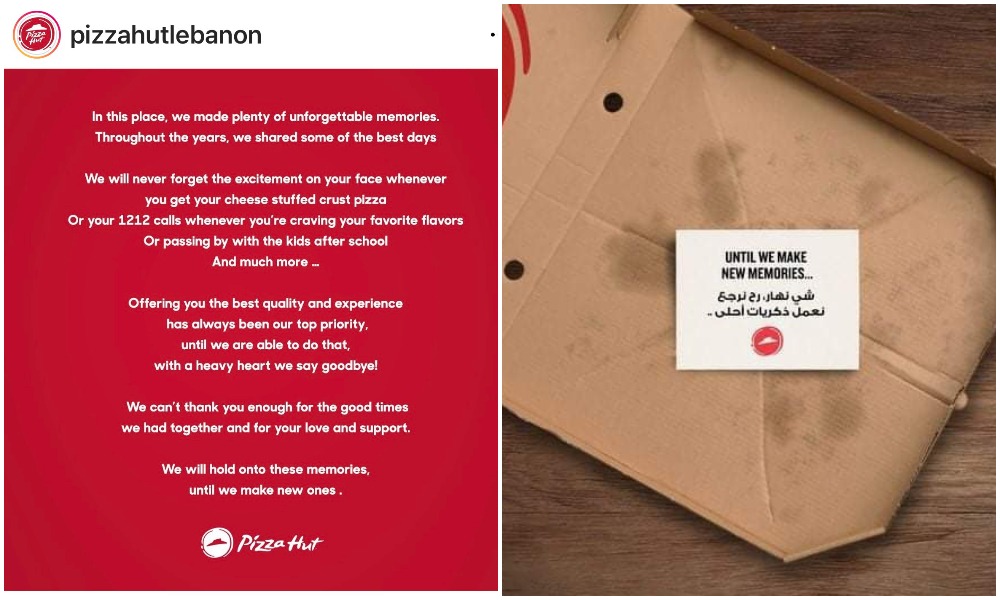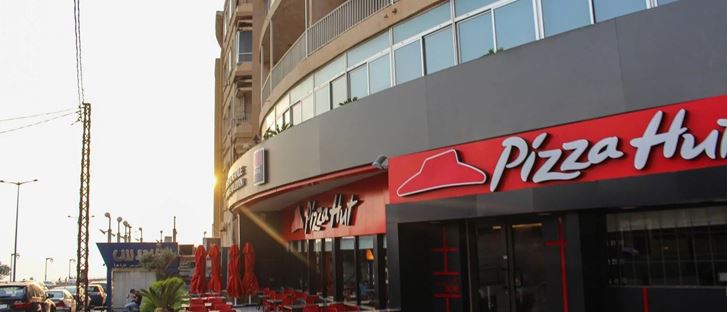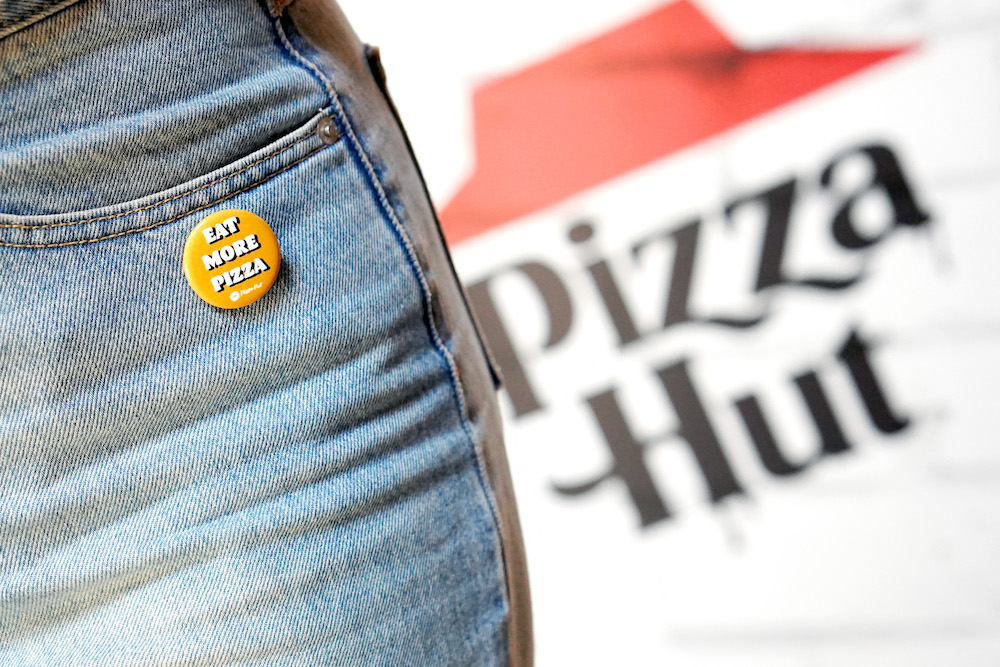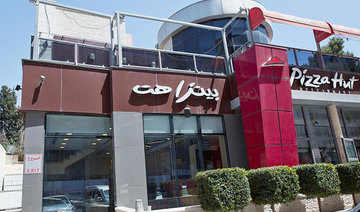BEIRUT: It was Valentine’s Day and grand plans for the perfect date had been set for a young woman in Beirut. Unfortunately, a last-minute work trip intervened and forced the postponement of the romantic night out. To console their heartbroken friend, Haya and Mel picked up the perfect comfort food.
“We ended up going to her place and I surprised her with pizza from Pizza Hut,” Haya told Arab News. “The restaurant was empty when I went to pick up the pizza. The chef let me decorate it with heart-shaped pepperoni.”
It might not have been the grand romantic gesture Haya and Mel had hoped to arrange for their friend after her boyfriend left, but they all enjoyed the evening and look back on it fondly.

They were therefore greatly saddened by the news that Lebanon’s favorite pizza chain was closing its doors, the latest culinary casualty of the country’s economic crisis.
In a message posted on Facebook on May 23, Pizza Hut Lebanon said: “We will never forget the excitement on your face whenever you get your cheese stuffed crust pizza ... Offering you the best quality and experience has always been our top priority. Until we are able to do that, with a heavy heart, we say goodbye.”

To some it might seem silly or trivial in a country where people have faced so much adversity in recent years to be upset about a fast-food joint closing down, particularly an international brand as ubiquitous as Pizza Hut.
But for others, a pizza on the table represents a social occasion to enjoy with family and friends, in a restaurant or at home, in a way that tacos or burgers and fries simply cannot match.
It is therefore understandable that the sense of loss goes beyond simple regret that the chain’s pizzas will no longer be available, and is perhaps more a reflection of the realization that precious memories of time spent in good company were often created while enjoying a slice or two.
Lebanon’s Culinary Decline
* 4,200 - Fall in restaurants and cafes since summer of 2019
* 2,000 - Establishments damaged in the Aug. 4 2020 blast
* 896 - Food and entertainment businesses that have shut in 2021
“My favorite memory is when they introduced PHD (Pizza Hut Delivery),” Farah Tabsh, a consultant in Dubai, told Arab News. “My mom was finishing her doctoral degree at the time. My brother, who was young, overheard us saying we were going to order PHD and he looked confused and said: ‘I thought that was mom’s job.’
“I think in general we equate Pizza Hut with a reward after school, like for doing well on a test or something. It was motivating when your parents said, ‘If you finish your homework, we’ll order Pizza Hut.’”
Other nostalgic customers said they will miss the restaurant experience the most.

Lebanese were greatly saddened by the news that Lebanon’s favorite pizza chain was closing its doors, the latest culinary casualty of the country’s economic crisis. (Supplied)
“It’s like a place where you connect with people — that was what Pizza Hut was for us,” said Sarah Siblini, an engineer who is studying for her Master of Business Administration.
“It wasn’t just delivery and takeout. When I think of Pizza Hut, I think of being at the place with people, enjoying my time with them and enjoying good pizza.”
The pizza chain — which was founded in 1958 in Wichita, Kansas, and is the biggest in the world based on number of branches — is the latest international brand to pull out of Lebanon or scale down operations there.
Others include soft drinks manufacturer Coca-Cola and its subsidiaries Fanta and Sprite, and sportswear company Adidas, which has closed its stores in the capital and is focusing on selling through third-party vendors

The brands are reacting to Lebanon’s overlapping crises, manifested in a plunging currency, skyrocketing inflation and mounting social unrest. The situation has been exacerbated by the COVID-19 pandemic, the devastating explosion at Beirut’s port in August last year and the ongoing political paralysis.
Many local and regional businesses have also been forced to close, such as Cafe Em Nazih and Grand Cafe, as has Couqley French Bistro.

Some Lebanese view the departure of Western brands such as Pizza Hut as an opportunity for local businesses to step in and fill the void. (Supplied)
“The sequence of crises since the summer of 2019 has reduced the number of restaurants and cafes from 8,500 establishments to 4,300,” said Tony Ramy, president of the Syndicate of Owners of Restaurants, Cafes, Nightclubs and Pastries. This year alone, 896 venues have closed so far, he told Arab News.
More than 2,000 establishments were partly or completely destroyed by the Beirut blast last year, which killed at least 200 people, injured about 6,000, and destroyed a large section of the city, including some of its hippest dining spots.
Many of the businesses that survived the devastation are struggling to survive the financial crisis and the effects of the pandemic. Even the famous, five-star Le Bristol Hotel — which in days gone by welcomed illustrious guests such as the last Shah of Iran, Mohammed Reza Pahlavi, Prince Albert of Monaco, and former French president Jacques Chirac — has succumbed to financial pressures, closing last year after nearly 70 years in business.
In a kind gesture to help ease the suffering of the community that hosted them for so long, the hotel’s owners donated all of its furnishings to local non-profit organization Beit El Baraka, which is helping to support those in the city who lost their homes or livelihoods in the port blast.
The explosion, caused by nearly 2,750 tons of improperly stored ammonium nitrate, was the final straw for many business owners struggling to survive the pressures of the financial crisis and stringent coronavirus restrictions.

Pizza Hut was just one of 896 food and entertainment businesses that have shut in Lebanon in 2021. (Supplied)
“Following several total and partial lockdowns in 2020 and 2021, and despite the opportunity to be back in business, the restaurant sector is wary about reopening because operational costs now outweigh profits,” Ramy said. The reason for this is that purchases from suppliers are based on the exchange rate of the dollar in the parallel market, he said, which is much higher than the official rate and has caused prices to soar.
Even before the pandemic brought normal daily life grinding to a halt, Lebanon was experiencing an economic catastrophe of unprecedented proportions, with its currency losing 80 percent of its value.
According to the World Bank, real gross domestic product growth contracted by 20.3 percent last year and the inflation rate hit triple digits. The financial meltdown, the worst in the country since the 1975-1990 civil war, triggered social unrest across the country.
Restaurant Closures
October 2019 - Grand Cafe Downtown
April 2020 - Le Bristol Hotel
Aug. 4, 2020 - Cafe Em Nazih
October 2020 - Couqley
May 2021 - Pizza Hut

Fights have broken out in supermarkets over basic items such as cooking oil and powdered milk, while soaring unemployment and inflation have plunged half of the population into poverty.
Meanwhile, a temporary caretaker government, which took over when the elected authority resigned in disgrace following the Beirut explosion, remains in place 10 months later as politicians continue to squabble over the composition of a new cabinet.
The Lebanese people, who have endured so much hardship in recent decades, have a habit of finding silver linings even in the midst of seemingly impenetrable gloom. Some, for example, view the departure of Western brands such as Pizza Hut as an opportunity for local businesses to step in and fill the void — a cleansing, perhaps, that might make way for a social and cultural renaissance.
“There is a lot of hope among local companies, so I’m not saddened that Pizza Hut is closing, because I see the opposite: the local flourishing,” said Siblini.
“Even though we had good memories, they are just memories — and memories are in the past.”

























